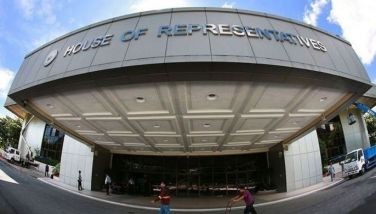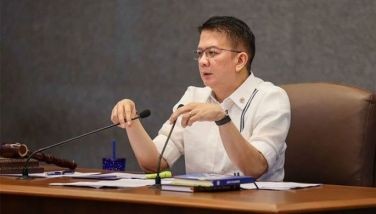NSC: Tanods may arm but must get license
October 24, 2002 | 12:00am
Local government units (LGUs) in Metro Manila are working to arm their barangay tanod brigades to thwart terrorists even as the national government pushes for the passage of an anti-terrorism bill.
At least 18,000 barangay tanods in Metro Manila will be issued guns to augment the country’s undermanned police force.
These tanods will be mobilized to enforce peace and order in their neighborhoods and help thwart terroristic attacks.
"They will be doing general police work," to bolster an understaffed police force, Metropolitan Manila Development Authority (MMDA) Chairman Bayani Fernando said yesterday.
Fernando said the proposal to arm and train tanods to augment the personnel of the Philippine National Police (PNP) in Metro Manila was approved in a recent meeting between the National Security Council (NSC) and local officials in the wake of the Friday bus bombing in Balintawak, Quezon City that killed two people and injured 20 others.
"This armed (tanods) is actually not (meant to address terrorism alone, but criminality (in particular). That is for peace and order in general," Fernando said.
The PNP has complained that the sprawling metropolis suffers a shortage of police personnel, with only 18,000 officers safeguarding 11 million residents — less than half of the 45,000-strong police force keeping watch over New York City.
Before they are given guns and training, Fernando said, the tanods will undergo psychological and physical examinations and one and a half months of firearms training. The neighborhood guards will be given low-caliber revolvers and will conduct patrols only in their own neighborhoods.
National Security Adviser Roilo Golez said the NSC, in a meeting Wednesday, "saw the danger of indiscriminate arming" of the barangay tanods.
"It was stressed that the arming of the tanods will follow the strict process of licensing and carrying of firearms," Golez said, adding that these neighborhood guards will be supervised in the same way as government militiamen in the countryside, known as the Civilian Armed Geographical Units (CAFGUs).
According Golez, "double control" will be exerted to ensure the tanods do not abuse their new authority or weapons.
Justice Secretary Hernando Perez said only neighborhood guards in "critical areas" will be allowed to carry guns.
Civilian guards, about 20 to each neighborhood, are the first to respond to trouble in their communities, but are only armed with rattan night-sticks or knives, Fernando said.
Giving these neighborhood guards guns would give them "a little confidence" in dealing with troublemakers, Fernando said.
"(The gun) is actually more of a deterrent, a symbol. It deters law-breakers or, at least, scares them away," the MMDA chief said.
At least 18,000 barangay tanods in Metro Manila will be issued guns to augment the country’s undermanned police force.
These tanods will be mobilized to enforce peace and order in their neighborhoods and help thwart terroristic attacks.
"They will be doing general police work," to bolster an understaffed police force, Metropolitan Manila Development Authority (MMDA) Chairman Bayani Fernando said yesterday.
Fernando said the proposal to arm and train tanods to augment the personnel of the Philippine National Police (PNP) in Metro Manila was approved in a recent meeting between the National Security Council (NSC) and local officials in the wake of the Friday bus bombing in Balintawak, Quezon City that killed two people and injured 20 others.
"This armed (tanods) is actually not (meant to address terrorism alone, but criminality (in particular). That is for peace and order in general," Fernando said.
The PNP has complained that the sprawling metropolis suffers a shortage of police personnel, with only 18,000 officers safeguarding 11 million residents — less than half of the 45,000-strong police force keeping watch over New York City.
Before they are given guns and training, Fernando said, the tanods will undergo psychological and physical examinations and one and a half months of firearms training. The neighborhood guards will be given low-caliber revolvers and will conduct patrols only in their own neighborhoods.
National Security Adviser Roilo Golez said the NSC, in a meeting Wednesday, "saw the danger of indiscriminate arming" of the barangay tanods.
"It was stressed that the arming of the tanods will follow the strict process of licensing and carrying of firearms," Golez said, adding that these neighborhood guards will be supervised in the same way as government militiamen in the countryside, known as the Civilian Armed Geographical Units (CAFGUs).
According Golez, "double control" will be exerted to ensure the tanods do not abuse their new authority or weapons.
Justice Secretary Hernando Perez said only neighborhood guards in "critical areas" will be allowed to carry guns.
Civilian guards, about 20 to each neighborhood, are the first to respond to trouble in their communities, but are only armed with rattan night-sticks or knives, Fernando said.
Giving these neighborhood guards guns would give them "a little confidence" in dealing with troublemakers, Fernando said.
"(The gun) is actually more of a deterrent, a symbol. It deters law-breakers or, at least, scares them away," the MMDA chief said.
BrandSpace Articles
<
>
- Latest
- Trending
Trending
Latest
Trending
Latest
Recommended



























